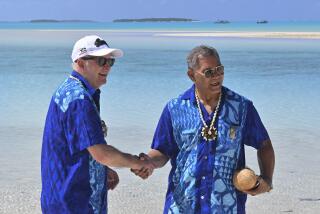Australia tells travelers ‘nanny state’ won’t help much with trips
Australians like to call their country a “nanny state” — but the nanny has had enough.
The Australian Department of Foreign Affairs and Trade on Wednesday told Australian travelers to toughen up and show a little more self-reliance, publishing a list of peculiar requests from Aussies who have contacted consular offices for help while overseas or even before leaving home for the airport.
One traveler wanted a loan to pay a prostitute in Thailand. Another called Australian officials for a risk assessment of a foreign city and armored cars for a week. Another asked what the food would be like on a cruise.
Those who turned to officials expected them to provide interpreters, clear speeding tickets, carry out searches for missing people, investigate crimes, pay doctor bills, recommend hotels, arrange visas, hold mail for collection, or phone hotels to find and book a room.
One of the most common phone calls was to find the closest bar televising Australian rugby matches. The government does not provide that service either.
Foreign Minister Julie Bishop on Wednesday said there was need for “a stronger culture of self-reliance and personal responsibility [among] the traveling public.” The government was considering introducing fees for consular services, she said.
Australia, with a population of 23 million, counted more than 9 million overseas visits last year. Each day, 1,300 Australians call the consular office for help with emergencies including accidents, arrests, deaths, missing people and passport theft.
In 2013, consular officials helped 15,000 Australians. The embassy receiving the most requests for assistance was in Bangkok, Thailand, but Australian government offices in Bali, Indonesia, Manila, the Philippines, Los Angeles and Dubai, United Arab Emirates, received plenty of requests as well.
With the Australian dollar plummeting and a conservative government cutting spending in a bid to reduce the country’s ballooning deficit, public service funding is under intense pressure. The strategy released Wednesday was designed to maintain the “agility” of the consular service in a changing world — code for cutting costs.
The list of things the government cannot do includes “guarantee your safety and security in another country or make your travel arrangements” and “get you out of prison or prevent you from being deported.” The list of things the government may do includes “issue replacement passports and travel documents for a fee” and “provide details of local doctors and hospitals in a medical emergency.”
Officials made it clear they would appreciate fewer inquiries such as the one from a mother who asked consular officials in Bangkok to arrange a return ticket to Australia for her son as well as an embassy driver to get him to the airport. In another case, officials were asked whether sand in Egypt would affect a traveler’s asthma.
Some people wanted to borrow a laptop. Some wanted a place to leave their luggage for a few days.
One traveler wondered: “On my last trip to the Philippines I had some trouble with the law. What is the number of the embassy in Manila so I can call them to get me out of jail when I go back?”
The Department of Foreign Affairs and Trade said officials couldn’t get people out of jail or get them placed in a better prison cell.
Officials called on travelers to take basic precautions — like researching travel advice and taking out travel and health insurance — and published new guidelines pointing out that Australians had no “right” to any consular services.
In a notice on the department’s website, the nanny state’s tone seemed more like that of a schoolmarm: “You do not have a legal right to consular assistance and you should not assume that assistance will be provided. We may limit the assistance we extend to you if we consider the circumstances warrant, for example, where your actions were illegal, or you have deliberately or repeatedly acted recklessly or negligently and put yourself or others at risk.”
Other questions the department could do without included:
Can you feed my dogs while I’m away?
Can you come and pack my bags for me?
Could you drop by Qantas lost and found, because I left something on the plane?
The answers: No, no and no.
Twitter: @RobynDixon_LAT
More to Read
Start your day right
Sign up for Essential California for news, features and recommendations from the L.A. Times and beyond in your inbox six days a week.
You may occasionally receive promotional content from the Los Angeles Times.






